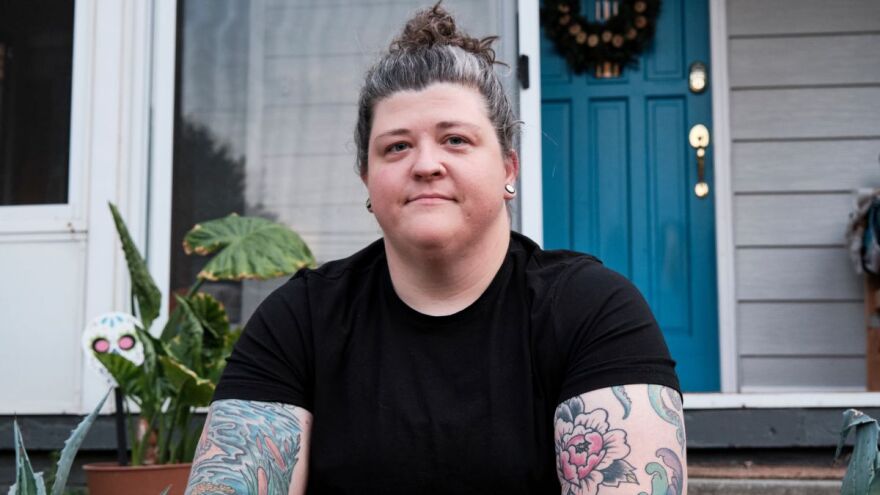Twelve years ago, Scout DeSimio was living out of her car.
For 10 months, she would nap during the day while parked at the Nelson-Atkins Museum of Art. At night, she drove around for hours with nowhere to go.
DeSimio had recently graduated from college and left El Dorado Springs, Missouri, her hometown, to seek greater opportunities in Kansas City. She also hoped to find acceptance.
At 18, her parents had kicked her out of her family’s home.
They “sat me down and said, ‘We’re not gonna support you anymore because you’re gay,’” she recalled. “I didn’t have a safety net, and I knew if I’m going to make it in this life, then I’m going to have to tough it out.”
Now, DeSimio works for SAVE Inc., a local organization that provides permanent, transitional and emergency housing assistance. Though Pride Haven — a shelter for queer young adults run by SAVE Inc. — DeSimio can help young people who, like herself, found themselves unhoused and out of options because of discrimination.
Kansas City has transitional shelters that accept young people, but many of those institutions are faith-based. At those shelters, queer residents who are looking for a safe place to stay might experience discrimination such as not being identified by their preferred pronouns, being denied clothing or being refused bed assignments that align with their gender identity.
As a result, the city has a significant need for shelters that cater to people who are LGBTQ+. Pride Haven and Lion House are two shelters specifically for LGBTQ+ people in Kansas City, but otherwise options are limited. The need far surpasses the resources available.
Concerns over faith-based shelters

Last year, workers logged 93 young adults 18 to 24 years old who were sheltered and unsheltered — living on the streets or not — in the local point-in-time count, an annual census of unhoused people. That number is an undercount, advocates say. It likely doesn’t reflect the young people who are staying in cars, squatting in abandoned buildings or temporarily living with friends.
At Pride Haven alone, 150 young people seek shelter each year, DeSimio said.
On any given night, all 20 beds at Pride Haven are taken, and there’s a waiting list of at least 20 young adults. “Sometimes it can be weeks before we’re able to get someone in,” DeSimio said.
Officials at Lion House estimate that nearly 50% of unhoused metro-area young people are LGBTQ+.
Young and unsheltered LGBTQ+ people are disproportionately represented among houseless populations nationwide. Nearly 35,000 13- to 24-year-olds responded to the Trevor Project’s 2021 National Survey on LGBTQ Youth Mental Health. Of those, 28% reported that they were unhoused or experienced housing instability at some point in their lives, according to the Trevor Project, a national organization focused on suicide prevention for young people who are LGBTQ+.
Young queer people also have to be mindful of organizations that might impose rules stifling their identity when seeking shelter, such as forcing transgender clients to adhere to dress codes based on birth-sex assignment, some experts say.
“Many programs are very reluctant to house people who don’t conform to whatever is on their birth certificate,” said Donald Whitehead Jr., the executive director of the National Coalition for the Homeless, the oldest national organization focused on ending homelessness in America.
“People end up in shelters that are ripe with abuse because they are in there with people who don’t necessarily have the same gender identity,” he said.
One negative experience in a shelter can shift a young queer person’s long-term perception of case managers and social workers, advocates say.
Kris Wade has seen that shift firsthand. Wade is the founder and executive director of The Justice Project, a local organization that supports and advocates for women in poverty. She said she has had transgender clients who sought help at local faith-based shelters who were outed, misgendered or harassed by volunteers and workers.
“Most LGBTQ people on the street have had some sort of system contact, such as jail or mental health providers, and generally they’ve had bad experiences, such as being misunderstood and judged, so they shy away from reaching out for help,” she said.
“A lot of them don’t know what’s available to them.”
More services needed for LGBTQ youth
SAVE Inc. first opened as a hospice care center for people who tested positive for HIV/AIDS in 1986, as the HIV epidemic swept through Kansas City and the rest of the country, proving fatal for millions of Americans, especially members of the LGBTQ+ community.
In 2016, SAVE Inc. began to shift its focus to serving young adults, specifically by connecting them to mental health and housing services. By 2021, the organization began to focus on providing housing services for queer young adults.
DeSimio says that representation is what makes services like theirs effective.
“What’s great about us and Lion House is that it’s led by queer people and for queer people, so that makes the experience a little different for folks,” she said.
She also said their smaller shelter, located in midtown, helps clients feel safe and secure. DeSimio would like to see more investment in small-scale shelters catering to unhoused LGBTQ+ young adults to meet the local need.
Reallocating funds and grants from some of the city’s biggest faith-based shelters has been an ongoing conversation, said JD Bezares, the housing commissioner for the LGBTQ Commission of Kansas City.
“We’ve pressed the city about them not giving equitable access to LGBTQ orgs that are asking for similar funds,” he said. “We need to find a way to house LGBTQ youth.”
This story was originally published on the Kansas City Beacon.





